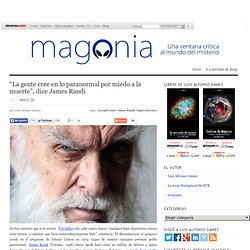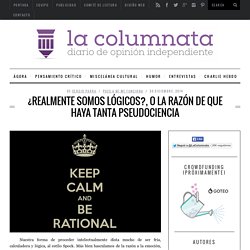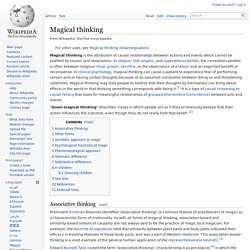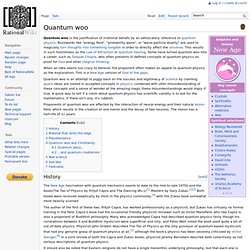

"Los naturópatas también van al oncólogo cuando tienen cáncer" VALENCIA.

Mientras se produce la entrevista, una noticia incendia las redes sociales. En el hospital Vall d'Hebron (Barcelona) ha ingresado en estado grave un niño de seis años con difteria. Es el primer caso en España desde 1987 y para conseguir el fármaco que le pueda curar hay que traerlo de Rusia: ningún otro país lo tiene porque ya no se utiliza. El chaval no está vacunado ya que su padres no creen en esas cosas y son partidarios de la medicina alternativa. Más casos como este pueden leerse en El peligro de creer (Ed. "La gente cree en lo paranormal por miedo a la muerte", dice James Randi. No hay misterio que se le resista.

“Uri Geller sólo sabe cuatro trucos. Cualquier buen ilusionista conoce entre treinta y cuarenta que hace extraordinariamente bien”, sentencia. Richard Dawkins vs Deepak Chopra. Why Do Many Reasonable People Doubt Science? There’s a scene in Stanley Kubrick’s comic masterpiece Dr.

Strangelove in which Jack D. Ripper, an American general who’s gone rogue and ordered a nuclear attack on the Soviet Union, unspools his paranoid worldview—and the explanation for why he drinks “only distilled water, or rainwater, and only pure grain alcohol”—to Lionel Mandrake, a dizzy-with-anxiety group captain in the Royal Air Force. Ripper: Have you ever heard of a thing called fluoridation? Fluoridation of water? Mandrake: Ah, yes, I have heard of that, Jack. Ripper: Well, do you know what it is? Mandrake: No. Ripper: Do you realize that fluoridation is the most monstrously conceived and dangerous communist plot we have ever had to face?
The movie came out in 1964, by which time the health benefits of fluoridation had been thoroughly established, and antifluoridation conspiracy theories could be the stuff of comedy. In a sense all this is not surprising. Library of Congress, Geography and Map Division. Demuéstrame que miento. - ¿Sabes?

He descubierto que en mi casa vive un duendecillo. - ¿Cómo? - Lo que oyes. ¿Por qué la gente cree en las pseudociencias y el esoterismo? Muchos investigadores se han preguntado por qué la gente se siente tan fascinada con la astrología, las casas encantadas y cosas por el estilo.

¿Realmente somos lógicos?, o la razón de que haya tanta pseudociencia. Nuestra forma de proceder intelectualmente dista mucho de ser fría, calculadora y lógica, al estilo Spock.

Más bien basculamos de la razón a la emoción, mezclando el pensamiento lento (racional) con el pensamiento rápido (instintivo), que diría el Nobel de Economía Daniel Kahneman. Hasta muchos de nuestros razonamientos aparentemente lógicos están infiltrados de vetas emocionales. Magical thinking. Magical thinking is the attribution of causal relationships between actions and events which cannot be justified by reason and observation.

In religion, folk religion, and superstitious beliefs, the correlation posited is often between religious ritual, prayer, sacrifice, or the observance of a taboo, and an expected benefit or recompense. In clinical psychology, magical thinking can cause a patient to experience fear of performing certain acts or having certain thoughts because of an assumed correlation between doing so and threatening calamities.
Magical thinking may lead people to believe that their thoughts by themselves can bring about effects in the world or that thinking something corresponds with doing it.[1] It is a type of causal reasoning or causal fallacy that looks for meaningful relationships of grouped phenomena (coincidence) between acts and events. Associative thinking[edit] Other forms[edit] Why People Believe Invisible Agents Control the World. Souls, spirits, ghosts, gods, demons, angels, aliens, intelligent designers, government conspirators, and all manner of invisible agents with power and intention are believed to haunt our world and control our lives.

Why? The answer has two parts, starting with the concept of “patternicity,” which I defined in my December 2008 column as the human tendency to find meaningful patterns in meaningless noise. Consider the face on Mars, the Virgin Mary on a grilled cheese sandwich, satanic messages in rock music. Of course, some patterns are real. Finding predictive patterns in changing weather, fruiting trees, migrating prey animals and hungry predators was central to the survival of Paleolithic hominids.
The problem is that we did not evolve a baloney-detection device in our brains to discriminate between true and false patterns. But we do something other animals do not do. Agenticity carries us far beyond the spirit world. “La gente que cree en pseudociencias no es idiota; simplemente, le falta información” ¿Cuál crees que es la mejor forma para luchar contra las pseudociencias? Quantum woo. Quantum woo is the justification of irrational beliefs by an obfuscatory reference to quantum physics.

Buzzwords like "energy field", "probability wave", or "wave-particle duality" are used to magically turn thoughts into something tangible in order to directly affect the universe. This results in such foolishness as the Law of Attraction or quantum healing. Some have turned quantum woo into a career, such as Deepak Chopra, who often presents ill-defined concepts of quantum physics as proof for God and other magical thinking. When an idea seems too crazy to believe, the proponent often makes an appeal to quantum physics as the explanation.
This is a New Age version of God of the gaps. Quantum woo is an attempt to piggy-back on the success and legitimacy of science by claiming quack ideas are rooted in accepted concepts in physics, combined with utter misunderstanding of these concepts and a sense of wonder at the amazing magic these misunderstandings would imply if true. [edit] History. File:Sciencefaith.jpg - Psiram.